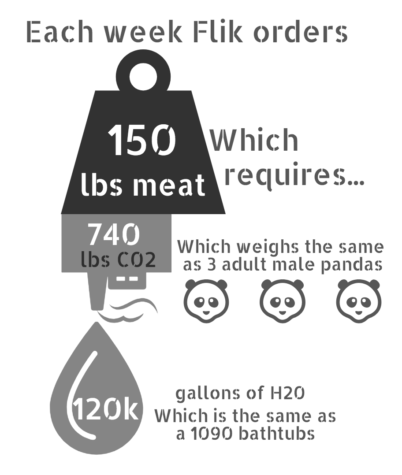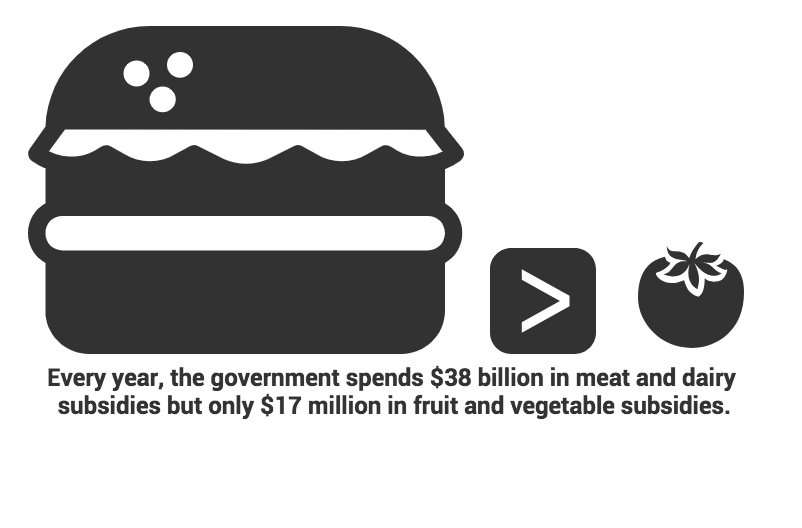Urban leads SF high schools with Meatless Mondays
Infographic comparing meat industry subsidies to fruit and vegetable industry subsidies. Source: Meatanomics. Infographic by Kian Nassre, Web Editor.
This December, Urban may become the first school in San Francisco to implement Meatless Mondays if the trial for the new menu is proven successful.
Out of concern for the dire state of the environment, Urban student Ella Rosenblatt ‘19 brought the idea of Meatless Mondays to the school administration, which launched a committee and secured a trial date for the new cafeteria menu. On the first day of the Meatless Mondays trial, Urban students faced the daily lunch rush to find a completely meatless menu on both campuses. Despite the menu change, Chef David Labao assured students that “they will still get my daily offerings, just with no animal protein.”
Flik, the food catering company that runs Urban’s food program, was receptive to the concept, but has maintained that the company must continue to make money on the days they serve a meatless menu. This monetary hurdle lends itself to a bigger debate surrounding whether businesses will be able to maintain their bottom line while appealing to environmental interests. “[The future of Meatless Mondays at Urban] is largely going to depend on how the students respond to it and if there’s enough of a culture switch so that they still buy the meals,” Rosenblatt said.
The push for Meatless Mondays at Urban coincides with the release of the UN Climate Report this fall. The report outlined a new reality in which the human race has a mere 12 years left to limit the impact of climate change before sea level and temperature rise become an unavoidable catastrophe. The report claimed that once greenhouse emissions result in a global temperature increase of 2 degrees Celsius above pre-industrial levels, climate devastation will be unavoidable. By 2011, about half of this maximum amount of greenhouse gasses had already been emitted.
The global meat and dairy industry is the single largest contributor to greenhouse gasses around the world. According to the Meatless Mondays organization that was founded by the Center for a Livable Future (CLF) at the Johns Hopkins Bloomberg School of Public Health, the industry releases more greenhouse gas emissions than the entire transportation sector.
The impact of meat consumption extends beyond greenhouse gas emissions. According to OneGreenPlanet, a nonprofit organization that promotes environmentally conscious eating habits, 1,600 trees are chopped down every minute in the Amazon rainforest for cattle grazing and livestock feed.
Although large-scale climate instability may be daunting, Rosenblatt said that “diets are things that people can individually control, so doing something that is individually attainable is a step in the right direction. I think that going meatless is really a great way for people to have a big impact with their daily choices.”
Having a meatless menu at Urban one day a week will have a significant impact on the school’s carbon footprint during these vital twelve years. Based on Labao’s estimations, the Flik cafeteria orders an average of 150 pounds of meat per week, including chicken, pork and beef, which requires 120,565 gallons of water and produces 740 pounds of carbon dioxide. By simply going meatless on Mondays, Urban will conserve approximately 24,113 gallons of water and 148 pounds of carbon dioxide for every week they implement the menu.
Despite the large impact of the meat industry, the environmental consequences of eating habits are not prominent in people’s minds. According to Jenn Epstein, Urban health teacher and faculty advisor of the Meatless Mondays committee at Urban, “when people think of environmental issues, meat is not at the forefront. They think about driving, electricity and maybe buying food locally, but not meat because there is a disconnect between what people think of as environmental issues and their lunch.”
The lack of awareness surrounding the environmental and health effects of meat is due, in part, to the U.S. government’s legislative and economic support of the meat industry. Although the Food and Drug Administration’s recommended healthy intake of meat is lower than what the average American consumes, the U.S. government has supported advertisements and campaigns encouraging meat consumption for decades.
According to Meatonomics, a 2013 diet book written by David Robinson Simon, the U.S. government provides $38 billion dollars annually in subsidies to the meat and dairy industry while only spending $17 million dollars to subsidize fruit and vegetables. In addition to subsidies, over 20 states, including California, have passed bills that forbid consumers to sue fast-food companies over weight gain linked to unhealthy foods. Meatonomics calculated that the price of a McDonald’s Big Mac would be $12, rather than its current price of $4.56 if the hamburger’s price reflected the actual costs of government subsidies for the meat industry and costs associated with the health effects of eating meat.
Despite the ways in which the United States Government protects the meat industry, Meatless Mondays have become a trend throughout the world. From Los Angeles public schools to the entire Norwegian army, eating a meatless diet one day a week is practiced in more than 40 countries by schools, restaurants and hospitals.
Kristen Tam, a senior at San Francisco Lowell High School, is attempting to implement Meatless Mondays throughout San Francisco public high schools. As a member of the San Francisco Youth Commission, Tam explained that SFUSD students want Meatless Mondays. “I was writing an environmental education resolution and as a part of that, we sent out a survey which found that 70% of SF high schoolers in both public and private schools were willing to go meatless one day a week,” Tam said. Despite these results, Tam explained that opposition to citywide Meatless Mondays has come from the “SFUSD Student Nutrition Services whose main concern is whether students eat lunch. They are worried that students may not eat the lunch if it’s meatless.”
Depending on the success of the December trial menu, Urban could join thousands of campuses around the world this coming year in practicing Meatless Mondays, though, as Labao warned, “it’s really going to take Urban students’ enthusiasm and willingness to buy meatless lunch to make this work.”

Source: David Labao.












